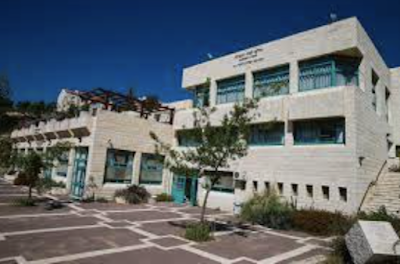Interview conducted by Sharona Eshet-Kohen
Chana Hirsch was an English teacher at the Jeanne Gluck High School Academy for Girls in Bet El for 24 years, from 1996-2020. In this interview she shares how she ended living and teaching in Bet El, and why she felt it her mission to teach Israeli children learn English.
My husband and I always knew we would make Aliyah, we didn't really have a choice in the matter. My husband has several relatives who are very well known Zionist Hassidic rebbes and both he and I were very involved in Bnei Akiva Olami both as children and as adults. In fact, when we got married we received a telegram from World Bnei Akiva asking when we will be making Aliyah!
But it took 10 years of marriage before we felt it was really the right time to go. We wanted to pay off all our college loans; it was important to us that we arrive in Israel debt-free. And when our oldest daughter was in 7th grade, my husband looked at me one day and said "If we don't go to Israel now, we never will." So we went on a pilot trip in March. I got offered a job on that trip as an English teacher at a boys' high school, and we made Aliyah three months later on August 22.
We originally moved to Jerusalem and soon found ourselves in Har Nof, but we were looking to buy a home in Judea/Samaria. We considered Efrat because we knew people who lived there and we looked at a few other towns as well. But then we heard from some of our neighbors in Har Nof that they were moving to Bet El and we already knew a family living there. When we told them we were thinking about moving there too, they said "Come visit us and see it - your house is being built right now!" (In 1992 houses were built in the Nitzanit neighborhood of Bet El.)
We came up to the house, saw the frame, I walked inside and within five minutes I knew it would be our home. Little did we know our friends in Har Nof had bought the house right next door!
When it came time for our daughter to choose a high school, she told us that she would be going to the ulpana (Religious-Zionist girls' high school) locally, in Bet El. I honestly had no idea that Bet El had a girls' high school! When I asked around I found out that the woman I had always just known as the "Mikveh lady" was the principal of the school! Clearly careers are not often discussed at the mikveh, because a couple weeks later she called me and said "I never knew that you're an English teacher!" And she offered me a job at the ulpana on the spot, which I accepted.
I worked at the girls high school in Bet El for 24 years (I retired last year) and I've lived in Israel for even longer. But my life is still full of Americanisms. We don't eat omelets for dinner; we have a big dinner where we all eat together as a family. We don't quite fit the "Kooknik" or "Hardalnik" [ed. note: various types of Religious-Zionism] molds. Nothing is easy, but we're here for a reason, and we're contributing to something greater than ourselves. I loved teaching English to Israeli teenagers. Of course, Hebrew is lashon hakodesh [the holy language], but it's important to know other languages, and it's important to know that there is a whole world beyond Israel. We don't have to visit it, but we have to know it's there. When I worked at a boys' high school when I first made Aliyah I used to tell my students, "If you want to be a member of the Sanhedrin one day, you'd better learn English fast."
As a teacher there was always something to put a smile on my face. Walking down the street and hearing a voice calling "Morah! [Teacher]," and seeing a former student now with a mitpachat [head scarf for married women] on her head who I hadn't seen in 10 years. I've learned that you can change people, but usually not the way you think you're going to. You have to just keep doing what you do best and hopefully that will rub off on people and they'll want to accept what you have to say.
